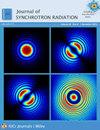Achieving nanosecond time resolution with a two-dimensional X-ray detector.
IF 3
3区 物理与天体物理
Journal of Synchrotron Radiation
Pub Date : 2025-09-01
Epub Date: 2025-08-18
DOI:10.1107/S1600577525006599
引用次数: 0
Abstract
The fastest pixel array X-ray detectors can record images with nanosecond resolution. This is accomplished by storing only a few images in in-pixel memory cells. In this study, we demonstrate nanosecond resolution over a large number of images by operating a prototype detector in an event driven mode. The performance of this mode is tested by measuring the Brownian dynamics of colloidal nanoparticles. We can achieve sub-100 ns time resolution and overcome the pixel dead time by applying a cross-correlation analysis of the neighboring pixels. The approach used in this work can be extended to study time-resolved fast processes with diffraction, scattering or imaging techniques.
利用二维x射线探测器实现纳秒级时间分辨率。
最快的像素阵列x射线探测器可以记录纳秒级分辨率的图像。这是通过在像素内存储单元中存储少量图像来实现的。在本研究中,我们通过在事件驱动模式下操作原型探测器来演示纳秒级分辨率。通过测量胶体纳米颗粒的布朗动力学来测试该模式的性能。通过对相邻像素进行互相关分析,可以达到低于100 ns的时间分辨率,克服像素死区时间。这项工作中使用的方法可以扩展到用衍射、散射或成像技术研究时间分辨的快速过程。
本文章由计算机程序翻译,如有差异,请以英文原文为准。
求助全文
约1分钟内获得全文
求助全文
来源期刊

Journal of Synchrotron Radiation
INSTRUMENTS & INSTRUMENTATIONOPTICS&-OPTICS
CiteScore
5.60
自引率
12.00%
发文量
289
审稿时长
1 months
期刊介绍:
Synchrotron radiation research is rapidly expanding with many new sources of radiation being created globally. Synchrotron radiation plays a leading role in pure science and in emerging technologies. The Journal of Synchrotron Radiation provides comprehensive coverage of the entire field of synchrotron radiation and free-electron laser research including instrumentation, theory, computing and scientific applications in areas such as biology, nanoscience and materials science. Rapid publication ensures an up-to-date information resource for scientists and engineers in the field.
 求助内容:
求助内容: 应助结果提醒方式:
应助结果提醒方式:


